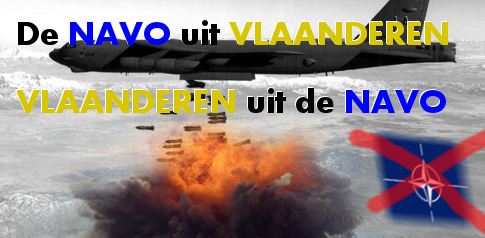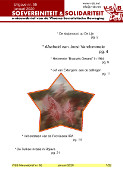 Terwijl zowat de voltallige Europese media en gevestigde politiek het conflict tussen de Spaanse Staat en het Catalaanse volk louter aftoetst aan de Spaanse grondwet, wordt blijkbaar over het hoofd gezien wat het internationaal recht over deze kwestie zegt.
Terwijl zowat de voltallige Europese media en gevestigde politiek het conflict tussen de Spaanse Staat en het Catalaanse volk louter aftoetst aan de Spaanse grondwet, wordt blijkbaar over het hoofd gezien wat het internationaal recht over deze kwestie zegt.
De Spaanse grondwet wordt voorgesteld als iets onaantastbaar en de maatstaf voor democratie en mensenrechten.
De realiteit is echter dat de Spaanse grondwet ingevoerd werd, kort na de dood van dictator Fransisco Franco, onder de dreiging van een nieuwe militaire staatsgreep (en voortzetting van de franquistische dictatuur). De Spaanse grondwet moest een compromis zijn tussen het streven naar democratie en het bewaken de erfenis van Franco. Het Spaanse leger moest waken over eenheid van de Spaanse Staat, de volgelingen van Franco konden zich nestelen in de staatsstructuren (justitie, politie, Guardia Civil, leger,...), er kwam geen 'denazificatie' tegen topfiguren van het Franco-regime en de door Franco als zijn opvolgor aangeduide koning Juan Carlos de Bourbon werd staatshoofd.
VN-expert Alfred de Zayas laat er echter geen twijfel over bestaan dat de Spaanse Staat hier het internationaal recht met de voeten treedt.
Enkele citaten:
"Ik betreur het besluit van de Spaanse regering om de Catalaanse autonomie op te schorten. Deze actie is een achteruitgang in de bescherming van de mensenrechten, onverenigbaar met de artikelen 1, 19, 25 en 27 van het Internationaal Verdrag inzake burgerrechten en politieke rechten (ICCPR)."
"Een volk het recht ontzeggen om zich uit te spreken over zijn zelfbeschikking, de wettigheid van een referendum ontkennen, geweld gebruiken om een referendum tegen te houden en de beperkte autonomie van een volk intrekken is een schending van Artikel 1 van het ICCPR en van het Internationaal Verdrag inzake economische, sociale en culturele rechten."
"De Spaanse regering lijkt het beginsel van territoriale integriteit in te roepen om gewelddadige pogingen om politieke dissidentie en de wil tot zelfbeschikking het zwijgen op te leggen, te rechtvaardigen. Hoewel het principe van territoriale integriteit belangrijk is, zoals bedoeld in veel resoluties van de Verenigde Naties, waaronder de Resoluties 2625 en 3314 van de Verenigde Naties, is het bedoeld om extern toe te passen, en vreemde bedreigingen of inbreuken in de territoriale integriteit van soevereine staten te verbieden. Dit principe kan niet worden ingeroepen om het mensenrecht uit te sluiten, gegarandeerd uit hoofde van artikel 1 van de internationale mensenrechtenovereenkomsten, om de wens uit te oefenen hun toekomst zelf te bepalen. Het recht op zelfbeschikking is een recht van volkeren en niet een prerogatief van de staten om te verlenen of te ontkennen. In het geval van een conflict tussen het principe van territoriale integriteit en het mensenrecht op zelfbeschikking, is het de laatste die voorrang heeft."
Integrale tekst:
UN independent expert urges Spanish Government to reverse decision on Catalan autonomyUN independent expert urges Spanish Government to reverse decision on Catalan autonomy
GENEVA (25 October 2017) - The UN Independent Expert on the promotion of a democratic and equitable international order, Alfred de Zayas, is calling on Spanish authorities to enter into negotiations in good faith with leaders in Catalonia following the announcement that the Spanish Government would suspend the region’s autonomy. On 19 October, the Spanish Government announced its intention to impose direct rule on the region after a deadline seeking an end to the Catalan independence campaign was not met. His statement is as follows:
“I deplore the decision of the Spanish Government to suspend Catalan autonomy. This action constitutes retrogression in human rights protection, incompatible with Articles 1, 19, 25 and 27 of the International Covenant on Civil and Political Rights (ICCPR). Pursuant to Articles 10(2) and 96 of the Spanish Constitution, international treaties constitute the law of the land and, therefore, Spanish law must be interpreted in conformity with international treaties.
“Denying a people the right to express themselves on the issue of self-determination, denying the legality of a referendum, using force to prevent the holding of a referendum, and cancelling the limited autonomy of a people by way of punishment constitutes a violation of Article 1 of the ICCPR and of the International Covenant on Economic, Social and Cultural Rights. Alternatively, addressing the aspiration of peoples to self-determination in a timely fashion is an important conflict prevention measure, as is evidenced by the countless wars that have occurred since 1945 that found their origin in denial of self-determination. Dialogue and political negotiation should be encouraged to prevent violence.
“The Spanish Government appears to invoke the principle of territorial integrity to justify forceful attempts to silence political dissent and aspirations of self-determination. While the principle of territorial integrity is important, as understood in many United Nations Resolutions, including GA Resolutions 2625 and 3314, it is intended to be applied externally, to prohibit foreign threats or incursions into the territorial integrity of sovereign States. This principle cannot be invoked to quench the right of all people, guaranteed under Article 1 of the International Covenants on Human Rights, to express their desire to control their futures. The right of self-determination is a right of peoples and not a prerogative of States to grant or deny. In case of a conflict between the principle of territorial integrity and the human right to self-determination, it is the latter that prevails.
“Of course, there are many peoples worldwide who aspire to self-determination, whether internal in the form of autonomy or external in the form of independence. And while the realization of self-determination is not automatic or self-executing, it is a fundamental human right that the international community should help implement.
“The international law of self-determination has also progressed far beyond mere decolonization. Applying the 15 criteria contained in my 2014 report (paras 63-77), it is evident that no state can use the principle of territorial integrity to deny the right of self-determination and that arguments about the legality of actions taken by Catalonia’s elected parliament are immaterial. Such arguments do not nullify the ius cogens character of self-determination.
“The only democratic solution to the current impasse is to suspend repressive measures and to organize a referendum so as to determine the true wishes of the population concerned. Such a referendum should be monitored by the EU, OSCE and private observers including the Carter Center.”
ENDS
Mr. Alfred de Zayas (United States of America) was appointed as the first Independent Expert on the promotion of a democratic and equitable international order by the Human Rights Council, effective May 2012. He is currently professor of international law at the Geneva School of Diplomacy. Mr. de Zayas practiced corporate law and family law in New York and Florida. As a Human Rights Council mandate holder, he is independent from any government or organization and serves in his individual capacity.
The Independent Experts are part of what is known as the Special Procedures of the Human Rights Council. Special Procedures, the largest body of independent experts in the UN Human Rights system, is the general name of the Council’s independent fact-finding and monitoring mechanisms that address either specific country situations or thematic issues in all parts of the world. Special Procedures’ experts work on a voluntary basis; they are not UN staff and do not receive a salary for their work. They are independent from any government or organization and serve in their individual capacity.
For more information and media requests, please contact Ms. Aminta Ossom (+41 22 917 9611 / Dit e-mailadres wordt beveiligd tegen spambots. JavaScript dient ingeschakeld te zijn om het te bekijken.) or write to Dit e-mailadres wordt beveiligd tegen spambots. JavaScript dient ingeschakeld te zijn om het te bekijken.
Concerned about the world we live in? Then STAND UP for someone’s rights today. #Standup4humanrights and visit the web page at http://www.standup4humanrights.org
http://www.ohchr.org/EN/NewsEvents/Pages/DisplayNews.aspx?NewsID=22295








